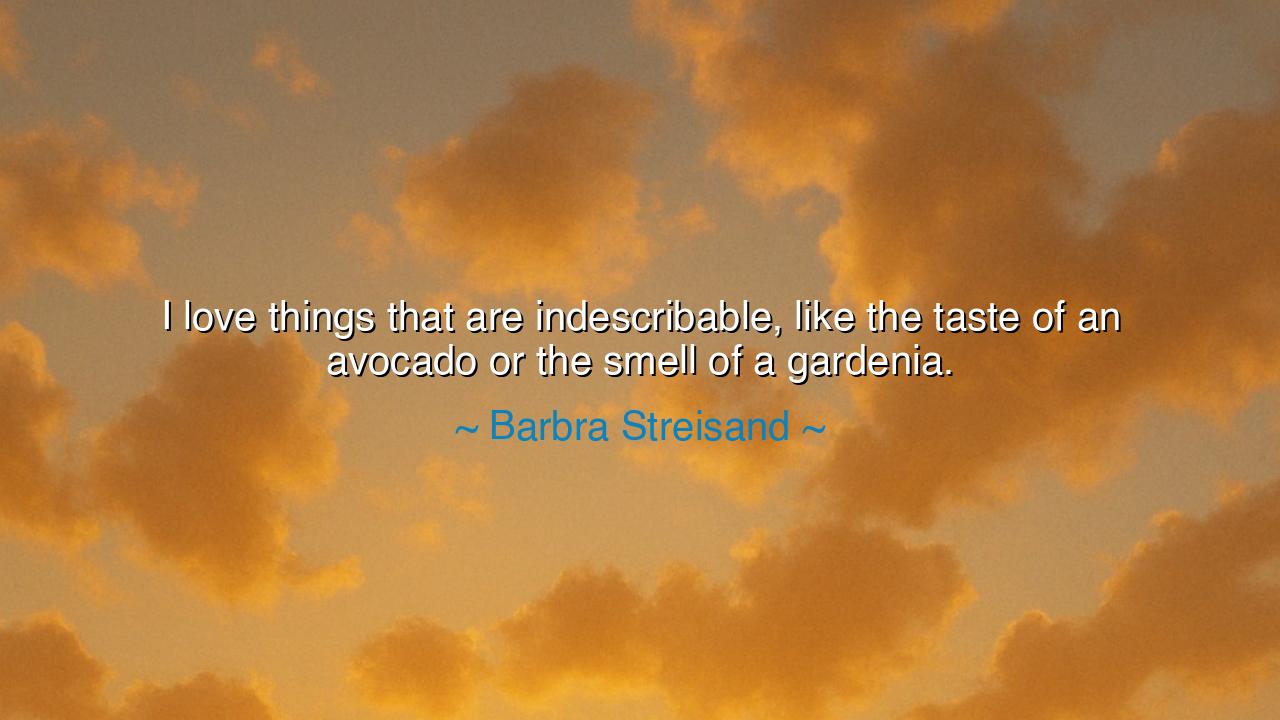
I love things that are indescribable, like the taste of an
I love things that are indescribable, like the taste of an avocado or the smell of a gardenia.






In the heart of the human experience, there lies a realm beyond words, a place where senses and emotions intertwine in ways that the mind can hardly grasp. Barbra Streisand, in her timeless reflection, speaks of this when she says, "I love things that are indescribable, like the taste of an avocado or the smell of a gardenia." These words point to an ancient truth: there are aspects of life that cannot be fully captured by language or reason, yet they stir the soul in profound ways. The avocado, with its creamy richness, and the gardenia, with its intoxicating fragrance, are not simply things to be consumed or admired. They are gateways to the deeper, mysterious parts of existence—senses that speak directly to the spirit, leaving us breathless and in awe.
The ancients knew well that there are experiences in life that cannot be fully explained, only experienced. Plato, the great Greek philosopher, often spoke of the Form—the eternal, unchanging truth that lies behind the physical world. According to Plato, the world of our senses was but a mere shadow of the true reality, a reality that could only be felt, glimpsed in moments of transcendence. The taste of something like the avocado, or the fragrance of a gardenia, could not be fully defined by words, but in the moment of their sensory experience, they could reveal something deeper about the soul—an encounter with the divine or the sublime. What Streisand expresses is this ancient longing for the indescribable, a desire to be connected to the essence of life in ways that go beyond the boundaries of speech.
In ancient India, the Upanishads spoke of experiences that could not be captured by ordinary language. These sacred texts described the ultimate truth of the universe as something that could only be known through direct experience, through a kind of mystical union with the divine. The beauty of a flower or the sweetness of a fruit was a manifestation of that divine reality, yet words could never do it justice. The Indians believed that the sensory world was a reflection of a deeper spiritual truth, and that by immersing oneself in the experience of the world, one could come closer to enlightenment. The gardenia, with its fragrance, and the avocado, with its taste, could serve as portals into that sacred realm—a reminder that the physical world, in all its beauty and richness, is intimately tied to the divine.
The ancient Romans also understood the power of the senses, particularly in their love of food and fragrance. The Romans were known for their lavish feasts, where the sensory experience of eating was just as important as the nourishment it provided. The Roman poet Horace celebrated the pleasures of the senses in his works, reminding us that there is a deeper joy to be found in the simple pleasures of life. The taste of a fruit or the scent of a flower was not merely about the pleasure it brought, but about experiencing the connection between the physical and the spiritual. To eat or to smell was to partake in the abundance of the world, to touch something transcendent. In this sense, Streisand’s words align with the Roman appreciation of the senses, which saw them as ways of accessing a deeper truth, a truth beyond words.
What Streisand is really pointing to is the mystery of life—the way certain experiences, though fleeting, have the power to stop us in our tracks and make us feel truly alive. The experience of something indescribable like the taste of an avocado or the fragrance of a gardenia calls us to pause and reflect, to step outside of the linear world of reason and into the timeless, boundless realm of the senses. This mystery, these moments of unspoken beauty, are like portals into something greater—something that cannot be fully understood, but only felt. The great sages of history spoke often of the need to step beyond the confines of the material world to connect with something that transcends our everyday experiences. These moments, like the avocado or the gardenia, offer a glimpse into that beyond.
In this recognition of the indescribable, there is also a lesson of humility. To be aware that not everything can be captured in words is to accept the limits of the human experience. Ralph Waldo Emerson, the American transcendentalist, spoke often of this idea, urging us to embrace the mystery of life and to seek wisdom not just in logic or discourse, but in intuition, experience, and beauty. He wrote that "The invariable mark of wisdom is to see the miraculous in the common." The avocado and the gardenia remind us that even the simplest, most ordinary things hold within them the potential for awe and wonder—if we are open to experiencing them in their fullness.
The lesson from Barbra Streisand’s reflection is one of connection. Life, with all its complexities, is often most beautiful in those moments when words fail us. The indelible taste or scent that transcends language calls us to remember that the world is filled with wonders that do not need to be explained to be fully appreciated. Experience becomes the teacher, and in these moments, we learn to listen to the world not with our minds, but with our hearts. Just as the ancients honored the senses as a bridge to the divine, we too must find space in our lives to stop, breathe, and simply be present with what is indescribable. Let us savor the avocados, smell the gardenias, and in doing so, reconnect with the sacred beauty of the world.






AAdministratorAdministrator
Welcome, honored guests. Please leave a comment, we will respond soon